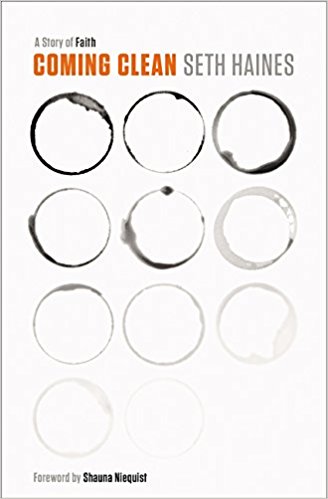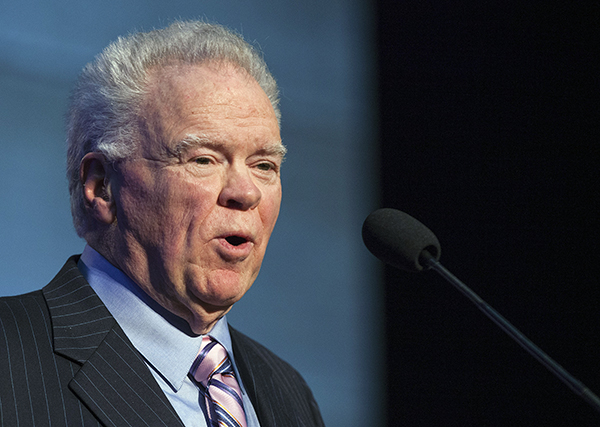The following is a guest post by Seth Haines, author of “Coming Clean: A Story of Faith“
I was not surprised by the news coming out of the Southern Baptist Convention over the last few weeks. I wasn’t shocked by Paige Patterson’s comments about spousal abuse, or his objectification of a 16-year-old girl, or the fact that the 75-year old president of Southwestern Baptist Theological Seminary allegedly terminated a PhD seminary student for tweeting about the controversy. I wasn’t blindsided by Patterson’s initial refusal to apologize, or his far-too-late late apology “to every woman who has been wounded by anything I have said that was inappropriate or that lacked clarity.”
I wasn’t surprised by any of it, and tellingly, many Southern Baptists weren’t either. But to understand how I got to this place–and how Southern Baptists got here–you’ll need a little bit of history.
Every Sunday of my childhood was spent sitting in awalnut-stained pew, facing the blue-carpeted platform, listening to the capital-t Truth preached in a homespun rhythm. I was Southern Baptist and that meant something.
What it meant, my preacher said,was that the world was created in a literal seven days just a few thousand years ago. It also meant that we would be whisked away from the evil earth in a miraculous rapture. Therewere moral absolutes, too—don’t drink, respect your elders, save sex for marriage, and never divorce.The scriptures were inerrant, I was taught, and they were meant to be interpretedliterally.
We had our beliefs, and we had our celebrity leaders. Their names were invoked by our preachers, our Sunday School teachers, and adults in the know.
Among those names were Paige Patterson and Judge Paul Pressler, paragons of virtue who’d rescued the denomination from creeping liberalism. It was said that Patterson and Pressler orchestrated the “Conservative Resurgence,” which refers to the period during which theological conservatives chased moderates from Southern Baptist seminaries, agencies, and pulpits. They’d saved the denomination from sliding into moral decay—or so the preachers told us—and they were the closest thing we had to saints.
I heard legends about these men and others like them, and though it was never directly intimated that they were above reproach, I assumed it. They’d become leaders in the Southern Baptist Convention, and their teaching was unquestionable. If they preached it, you could take it to the bank.

“Coming Clean” by Seth Haines is a story of faith and overcoming addiction. – Image courtesy of Zondervan
I was active in Baptist ministry into my mid-twenties. I served with good men, conservative ministers who were often outside of the power fabric of the Convention and who didn’t use their influence to silence, shame, or objectify women. Even still, I didn’t have to look far to find those who took a different approach. More than a few influential preachers seemed to value conservative theology over people. It wasn’t uncommon to hear sermons that subtly objectified women. There was an irreconcilable disconnect between what I believed and what I heard preached from so many like Patterson.
As it grew, I took my leave. I stepped away from the Southern Baptist world.
The years passed, and life did what life does. In my mid-thirties, I found myself in a darker season. My youngest son’s health was failing, and I’d been over-drinking to numb the pain. I’d nearly lost my way, but the grace of God intervened, and I was carried into sobriety. I began to explore what real life-change, real dependency on God might look like in this season of sobriety, but instead of turning to the steady diet of conservatism and moralism that hadn’t been helpful in my hour of need, I did what so many who struggle do. I turned to therapy and a program of recovery.
As I worked my way through weekly therapy, as I examined the wounds that led me to the bottle, I took note of the twelve steps of Alcoholics Anonymous. The steps were familiar, and I could find similar principles in the scriptures I’d learned in my youth. Among those steps, was the eighth step regarding making amends. As stated by Twelve Steps and Twelve Traditions, in the eighth step of recovery:
“[W]e take a look backward and try to discover where we have been at fault; next we make a vigorous attempt to repair the damage we have done; and third, having thus cleaned away the debris of the past, we consider how, with our newfound knowledge of ourselves, we may develop the best possible relations with every human being we know.”
The process of making amends in the 12-step rubric goes beyond simple apologies or acknowledgements of guilt. It’s an active, reparative thing. What’s more, it mirrors Christ’s teachings on seeking forgiveness and making amends.
In his most famous sermon, Jesus preached about repentance and seeking reconciliation. He taught, “So if you are offering your gift at the altar and there remember that your brother has something against you, leave your gift there before the altar and go. First be reconciled to your brother, and then come and offer your gift.”
READ ALSO: “Why Paige Patterson’s apology may not be enough”
Jesus knew that words are not enough. Reconciliation requires the willingness to lay down your gifts, to walk away from the very thing you think might justify you, and to make personal, specific, one-on-one attempts toward reconcile.
Paige Patterson should consider joining a 12-step program. It might teach him something about dealing honestly with his mistakes and making an effective amends.
In recent weeks, Patterson’s pattern of behavior has been exposed. As a result, and before he issued his apology, over 3,000 Southern Baptist women spoke up and signed a letterto the Southwestern Baptist Theological Seminary Board of Trustees. Their request was singular: “The Southern Baptist Convention cannot allow the biblical view of leadership to be misused in such a way that a leader with an unbiblical view of authority, womanhood, and sexuality be allowed to continue in leadership.”
In response, Patterson issued his apology. But he’s not stepped away from his position, nor has he been removed. There’s been no public clarity about his attempts to make amends or restitution for his damaging statements, either toward the women he’s directly offended, or to those who drafted the letter to his employer.
Still, it seems many Southern Baptist Convention leaders are content with his three paragraph apology. His words, they intimate, are enough.
https://twitter.com/johnnymhunt/status/994721818828210176
Jonathan, you are such a gifted journalist. God has given you a gift in writing. But when a brother in Christ has done wrong (like we all have) & he finally confesses what he has done wrong & apologizes, we are called to forgive like Jesus forgives us. Help us begin to heal. https://t.co/97dtooF3OC
— Bryant Wright (@bryantwright) May 11, 2018
I am thankful and appreciative for this from @_PPatterson_ . https://t.co/ddFxToqdAg
— Daniel Akin (@DannyAkin) May 10, 2018
Thank you Dr. @_PPatterson_ for clarifying your position and leading towards unity. https://t.co/H9NNeIdbHM
— Ronnie Floyd (@ronniefloyd) May 10, 2018
This is the heart of the man I have known for decades… thank you @_PPatterson_ https://t.co/XM93rwMpxv.
— O S Hawkins (@OSHawkins) May 10, 2018
But as both the 12-steps and the Gospel teach us, words are not enough. Christ-like reconciliation requires more than mere words. Reconciliation requires action, personal attempts to make amends, and when warranted, restitution. This, it seems, is something better understood by participants in AA than by the president of the Southwestern Baptist Theological Seminary.
There are good and upright men and women in the Southern Baptist Convention. There are faithful preachers and active participants in Baptist churches who’ve given their lives to bear witness to the work of Christ in reconciliation. For their sake and the sake of their church members, I pray they’ll ask Patterson to do the right thing.
I hope they’ll listen to those 3,000 Southern Baptist women who penned the letter, and in humility take action in accordance with that letter. This mirrors the way of Christ, whom Patterson claims to follow. It also paves the way for lasting healing, which is desperately needed within the Baptist church.
As it stands, 12-step programs like AA, which require proactive attempts to actually repair relational damage, have more moral authority than the nation’s largest Protestant denomination. Southern Baptist leaders should take a page from the AA book. If they don’t, they’ll watch as congregants leave their pews just like I did so many years ago.
Seth Haines is the author of Coming Clean: A Story of Faith, an Award of Merit honoree in Christianity Today’s 2016 Book Awards. Follow him on Twitter at @sethhaines.







